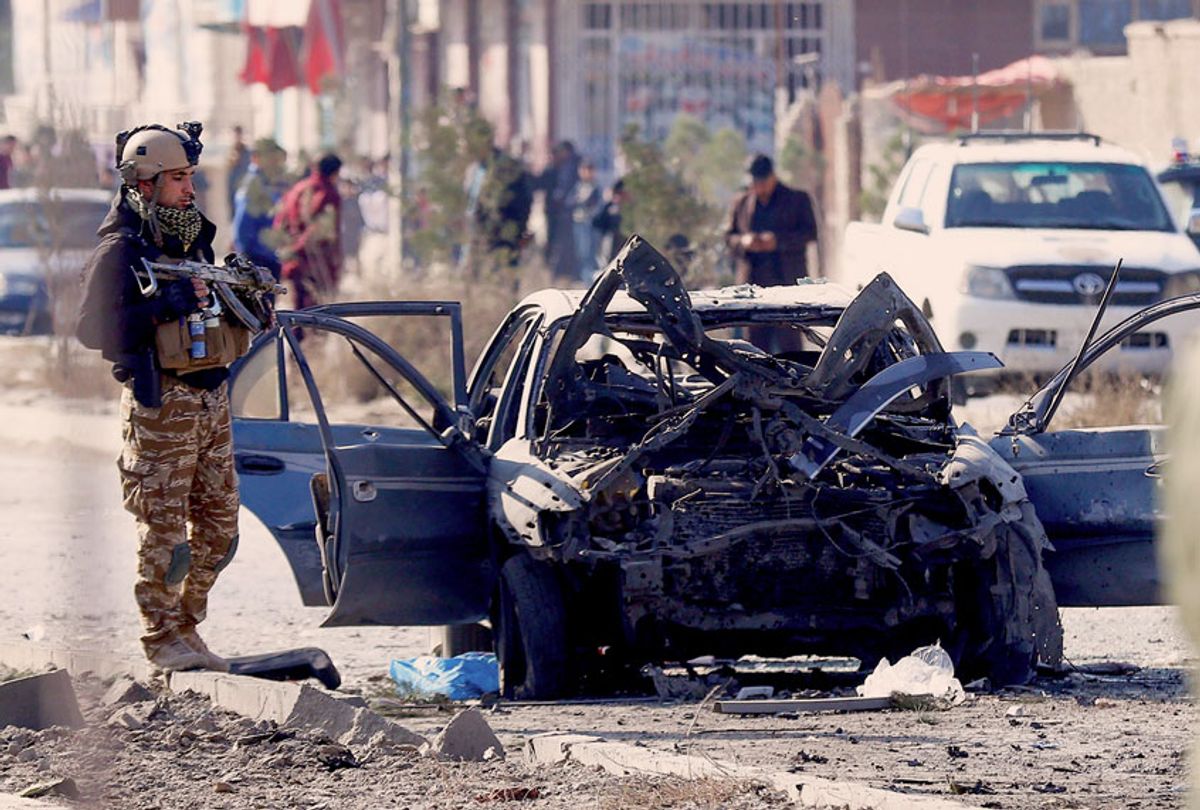The animating force of American political identity is war. For precisely this reason that all the candidates in the Democratic race for president (except for Rep. Tulsi Gabbard, polling at 1 or 2 percent) and the entire range of superstar liberal commentators — from Ta-Nehisi Coates to Rebecca Traister — have little or nothing to say about America’s destruction of Iraq, the existence of 800 military bases around the world, and the discretionary budget of the federal government, which allocates more than 50 cents of every dollar to the Pentagon.
America is a society that, without justification and with little political resistance, routinely annihilates innocent life. We do so without compunction from our political leadership, leading journalists, and general citizenry, as was recently laid bare by the Washington Post’s recent exposé on the war in Afghanistan. A massive discovery of Pentagon documents, including leaked interviews and testimony from former Secretary of Defense Donald Rumsfeld, high-ranking military brass and other Pentagon officials, reveals that as early as six months into the war, the U.S. government and military believed that the Afghan conflict was “unwinnable” (whatever that means), purposeless and ultimately harmful to the Afghan people, American military personnel and American foreign policy interests. That war has continued for 18 years, costing trillions of dollars, but even more shamefully, killing approximately 150,000 people, including more than 4,000 U.S. troops and "civilian contractors," more than 60,000 Afghan troops and at least 38,000 Afghan civilians.
Throughout the years of fighting, leading officials from three administrations, including the presidents themselves, have repeatedly lied to the public about the necessity and strategy of the war. George W. Bush, Barack Obama and Donald Trump, along with members of their Cabinets and their most influential military advisers, have advanced a manipulative propaganda campaign to provide cover for mechanized murder that, as they knew perfectly well, was accomplishing nothing.
The rest of the media has largely ignored the Washington Post’s undressing of the American government and military command as incompetent and immoral. Meanwhile, Congress has negotiated $738 billion for the military in the 2020 federal budget. Growing awareness that the Pentagon continually wastes the massive subsidy of taxpayer dollars that it receives, and that U.S. policy insists on dealing out mayhem and death with no clear strategy or goal that leading officials can articulate, has done nothing to temper the reckless funding of the military-industrial complex.
Defenders of the American two-party system, and its PR specialists in mainstream media, might respond that the impeachment of Donald Trump is so newsworthy that other stories cannot compete for the attention of the American people. Setting aside the illogic of such a claim in an era of 24-hour news television, and the unlimited possibilities of internet coverage, there is the more damning conclusion one can reach after comparing the crimes for which Trump has faced impeachment and those illustrated by the Afghanistan Papers.
Attempting to bribe a foreign leader to acquire gossip against a political opponent is contemptible, and worthy of punishment that includes removal from office. But is it nearly as iniquitous, or as evil, as presiding over the deaths of Afghan children and watching American soldiers return home in body bags and wheelchairs, all with the knowledge that such mass suffering is unnecessary and preventable?
The dubious phrases “American tradition” and “American values” are often central to the crescendos of congressional speeches condemning the behavior of Donald Trump. It appears that bombing cities, drone attacks on civilian weddings and poisoning the ecology of sovereign nations under false pretenses, from Vietnam to Afghanistan to Iraq, are expressions of American traditions and values — unworthy of significant debate, and certainly not subject matter for congressional inquiries.
The American people are not exactly unwilling accomplices in the American war machine. Far removed from the opulence of the White House and the U.S. Capitol, most Americans actually seem to believe that, as the mindless cliché holds, U.S. troops are "fighting for our freedom.” At time of writing, as far as I know, Afghan peasants armed with rifles are not assembling at the American border.
Ron Kovic, the paralyzed Vietnam veteran who wrote “Born on the Fourth of July,” one of the most powerful anti-war books in the American canon, said at the height of the carnage in Vietnam, “I cannot find the words to express how much the leadership of this country sickens me.”
Any renunciation of America’s commitment to war without the same passion and venom is insufficient. Silence is complicity.

Shares